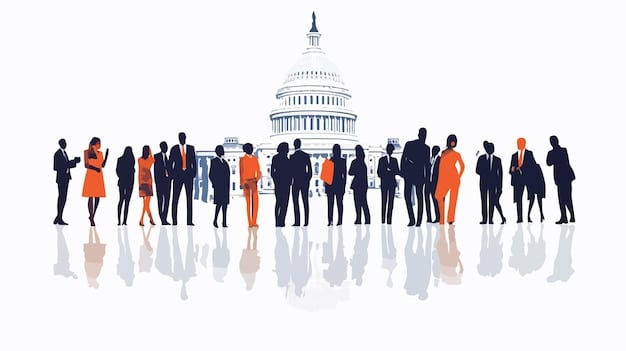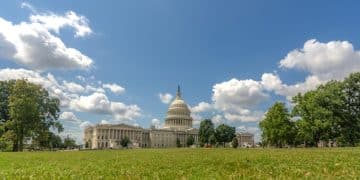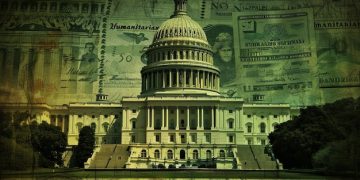The Impact of Lobbying on Congressional Decisions: A Data-Driven Analysis

The Impact of Lobbying on Congressional Decisions: A Data-Driven Analysis reveals how lobbying efforts, backed by data, affect the legislative process in the U.S. Congress and the policies that are shaped.
Understanding the impact of lobbying on congressional decisions: a data-driven analysis is crucial in today’s political climate. Lobbying, the act of attempting to influence decisions made by officials in the government, plays a significant role in shaping policies. But how significant is it, really?
This article will delve into the data behind lobbying efforts, exploring how they influence congressional decisions and uncovering the key players involved. Let’s explore the intricate relationship between lobbying and lawmaking.
Understanding the Basics of Lobbying
Lobbying is often misunderstood, perceived as a shadowy practice influencing politicians behind closed doors. While some of that perception may hold true, it’s essential to understand the formal definition and legal framework surrounding this activity.
What Exactly is Lobbying?
Lobbying encompasses any communication with a covered executive or legislative branch official intended to influence legislation. This can include direct contact, research, grassroots campaigns, and even public relations efforts designed to shape public opinion.
The Legal Framework: Regulations and Disclosure
In the United States, lobbying is regulated by laws like the Lobbying Disclosure Act of 1995 (LDA) and the Honest Leadership and Open Government Act of 2007. These laws require lobbyists to register with Congress, disclose their clients, and report their lobbying activities and expenditures. This transparency is intended to shed light on who is attempting to influence policy and how much they are spending.
- Registration: Lobbyists must register with the Clerk of the House and the Secretary of the Senate.
- Disclosure: They must disclose their clients, the issues they are lobbying on, and the agencies and houses they contacted.
- Reporting: Quarterly reports detailing lobbying activities and expenditures are required.
Understanding these basics helps to contextualize the impact of lobbying on congressional decisions: a data-driven analysis will further explore.
The Scale of Lobbying: Expenditure and Reach
To truly grasp the impact of lobbying on congressional decisions, it’s vital to understand the sheer scale of the industry. From the amount of money spent to the number of lobbyists employed, the figures are staggering.

How Much Money is Spent on Lobbying?
Lobbying is a multi-billion dollar industry in the United States. According to the Center for Responsive Politics, annual lobbying expenditures often exceed $3 billion. This immense financial investment underscores how much various interests value influencing policy outcomes.
Who are the Top Spenders?
The top spenders on lobbying vary from year to year, but some industries consistently rank high. These include:
- Pharmaceuticals: The pharmaceutical industry spends heavily to influence healthcare policy and drug pricing.
- Insurance: Insurance companies lobby on issues related to healthcare, financial regulations, and consumer protection.
- Energy: Oil, gas, and renewable energy companies lobby on energy policy, environmental regulations, and subsidies.
These industries see lobbying as a critical investment to protect their interests and shape policy in their favor. This reveals the tangible impact of lobbying on congressional decisions.
Analyzing Lobbying Data: Trends and Patterns
Analyzing lobbying data is crucial to understanding its effects. By examining trends and patterns, we can gain insights into which sectors are most influential and how lobbying strategies evolve.
Identifying Key Trends in Lobbying Activities
One notable trend is the increasing sophistication of lobbying strategies. Lobbyists now employ a wide range of tactics, including data analysis, grassroots mobilization, and sophisticated communication strategies.
The Relationship Between Lobbying Expenditure and Legislative Outcomes
Studies have shown a correlation between lobbying expenditure and legislative outcomes. While money doesn’t guarantee success, it certainly increases the chances of influencing policy decisions. Industries that invest heavily in lobbying often see favorable policy changes. It is a key element in assessing the impact of lobbying on congressional decisions: a data-driven analysis cannot ignore.

Case Studies: Specific Examples of Lobbying Influence
To illustrate the impact of lobbying on congressional decisions: a data-driven analysis, let’s examine a few case studies. These examples highlight how lobbying has shaped specific pieces of legislation.
Healthcare Reform: The Pharmaceutical Industry’s Role
During the debates over the Affordable Care Act (ACA), the pharmaceutical industry spent millions of dollars lobbying to protect its interests. They successfully influenced provisions related to drug pricing and market exclusivity.
Financial Regulation: The Banking Sector’s Influence
Following the 2008 financial crisis, the banking sector lobbied extensively against stricter regulations. While some reforms were enacted, lobbying efforts helped to weaken or delay certain provisions. The banking sector demonstrated a remarkable impact of lobbying on congressional decisions.
Environmental Policy: Energy Companies vs. Environmental Groups
The battle over environmental policy is another arena where lobbying plays a crucial role. Energy companies lobby to protect their interests, while environmental groups fight for stricter regulations and conservation measures. These opposing forces often result in legislative gridlock or watered-down compromises.
The Ethics and Implications of Lobbying
While lobbying is a legal and protected activity, it raises important ethical questions. Concerns about transparency, fairness, and the potential for corruption are often debated.
Transparency and Accountability Concerns
One of the primary concerns is the lack of transparency in lobbying activities. While disclosure laws exist, they may not capture the full extent of lobbying influence. Dark money and indirect lobbying efforts can be difficult to track, making it challenging to hold lobbyists accountable.
The Role of Money in Politics
The influence of money in politics is another ethical concern. Critics argue that wealthy individuals and corporations have a disproportionate influence on policy decisions, drowning out the voices of ordinary citizens. This raises questions about fairness and equity in the political process.
Potential Reforms and Solutions
To address these ethical concerns, various reforms have been proposed, including:
- Strengthening Disclosure Laws: Requiring more detailed and timely disclosure of lobbying activities.
- Limiting Campaign Contributions: Reducing the influence of money in elections.
- Increasing Transparency: Shining a light on dark money and indirect lobbying efforts.
These measures could help to level the playing field and ensure that policy decisions are made in the public interest.
| Key Point | Brief Description |
|---|---|
| 💰Lobbying Scale | Multi-billion dollar industry influencing policy. |
| 📊Data Analysis | Trends show sophisticated lobbying strategies. |
| 🏛️ Ethics | Concerns about transparency and money influence. |
Frequently Asked Questions
The main goal of lobbying is to influence decisions made by government officials, particularly legislators, to support specific interests or policies. This influence can take many forms, from direct communication to indirect campaigns.
Lobbying is regulated by laws such as the Lobbying Disclosure Act (LDA) and the Honest Leadership and Open Government Act, which require lobbyists to register, disclose clients, and report activities and expenditures.
Ethical concerns include a lack of transparency, the potential for corruption, and the disproportionate influence of wealthy individuals and corporations on policy decisions. This impacts evaluation ofthe impact of lobbying on congressional decisions.
Industries like pharmaceuticals, insurance, and energy are among the top spenders on lobbying, as they seek to influence policies related to healthcare, financial regulations, and environmental standards.
Data analysis can reveal trends in lobbying activities, show correlations between lobbying expenditure and legislative outcomes, and identify key influencers shaping policy. This makes analysis of the impact of lobbying on congressional decisions much more clear.
Conclusion
In conclusion, understanding the impact of lobbying on congressional decisions: a data-driven analysis is essential for informed citizenship. By examining the scale, trends, and ethical implications of lobbying, we can better assess its role in shaping public policy.
While lobbying is a protected activity, reforms are needed to ensure transparency, accountability, and fairness in the political process. Only then can we guarantee that policy decisions reflect the public interest.





